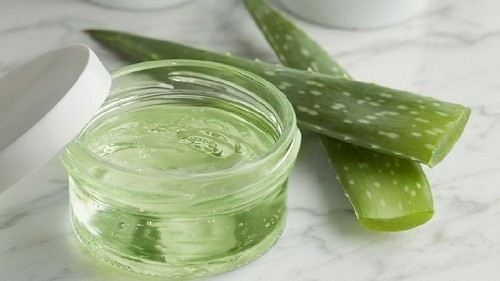Everything You Need To Know About Aloe Vera and Eczema


Wondering if aloe vera is right for treating your eczema? If you are dealing with red, itchy, and irritated skin, you want to get rid of the symptoms as quickly as possible! Fortunately, there are a few easy and natural options like aloe vera to both treat eczema and prevent it from coming back.
Ready for cool, calm, and comfortable skin? Here’s what you should know about aloe vera for eczema and other effective ways to treat and prevent discomfort.
What Is Eczema?
Before you can tackle your skin condition, it’s essential to understand what you are dealing with. In basic terms, eczema is inflamed or irritated skin. It actually comes from a Greek word that means “to boil” and if you’re suffering from eczema, you know how it earned that name!
Eczema isn’t just a single condition. It is actually the name for a range of issues that cause itchy and inflamed skin. In fact, there are eight types of eczema including atopic dermatitis, contact dermatitis, dyshidrotic eczema, hand eczema, lichen simplex chronicus, nummular eczema, seborrheic dermatitis and stasis dermatitis.
Not only could you have any one of these eight different types of eczema, you can actually have more than one different type at any given time. While there are a few defining characteristics of each type, it’s not easy to guess your type or even know for sure that you have eczema without a diagnosis.

To know what you’re dealing with, you will want to start with a visit to your doctor. After you are certain that you have eczema, there are some powerful home remedies that you can use to relieve your symptoms.
Is Eczema Contagious?
If you are dealing with eczema, it is essential to know that eczema is not contagious. You don’t have to worry about passing it along to someone else or catching it.
While it’s not contagious, it is believed to be hereditary. If you have eczema, there’s a good chance that somebody else in your family has it. Eczema is very common. It affects one to three percent of adults, and an incredible ten to twenty percent of children.
What Causes Eczema?
Believe it or not, doctors don’t actually know exactly what causes eczema. They believe it is some combination of genetics and environment. It seems that a range of factors can cause the immune system to go into overdrive. Typical causes include dry skin, stress, climate, hormonal changes, and irritants like soaps and household cleaners, cigarette smoke, perfume. And, while it might seem counterintuitive, a lot of moisturizers can irritate and dry out your skin. That’s why we love aloe vera for eczema prone skin. All natural and soothing, it’s perfect for ultra sensitive skin.
HOW TO TREAT AND PREVENT ECZEMA
So, now that you know what you are dealing with, what can you do to treat and prevent eczema?
HERE ARE A FEW QUICK AND EASY STEPS!
Lay off the soap. Soap is very drying to your skin. Use it limitedly and opt for simple formulas. Look for options that are clear and mild. Avoid deodorant soaps and anything with fragrance. Also keep in mind that you don’t need to wash your entire body from head to toe with soap. There’s really no need to wash your entire arm or leg, for example. Just soap up the spots that tend to get sweaty and dirty.
- Tip- Look for body washes with added natural moisturizers like aloe vera and shea butter for extra nourishment.
Turn down the heat. Avoid taking long, hot showers. It might feel good, but it will dry out your skin and can make eczema worse.
Take more baths. Soaking your skin can be helpful if you do it strategically. Use lukewarm water and try adding bleach. One-half of a cup of bleach in a full bathtub is recommended by doctors. Just sit in the bath for ten minutes. And, of course, listen to your skin. Don’t bathe too often or do anything that causes excess irritation.
Always follow up with moisturizer. Every time you wash your skin, put on moisturizer afterwards. It is important to just gently pat your skin dry then use plenty of moisturizer. For extra hydrating power, consider a lighter all-over body lotion, then dab aloe vera onto your driest areas.
Use all natural creams and lotions. When you use moisturizer, always opt for natural ingredients. Ultimately, the fewer ingredients you see on the label, the better it will be for your skin.
Carry aloe vera and moisturizers. Small travel sized bottles of moisturizers and aloe vera are must-haves. Keep some stashed in your desk, car, bag, and everywhere else so that you can have instant replenishing moisture every time you wash your hands.
Use mild detergents. People often forget how many chemicals they are dousing their clothes with. Avoid colored and scented laundry soaps that can irritate you skin, as well as fabric softeners. Stick with all natural detergents and consider doing an extra rinse and spin after your washing cycle to get off as much residue as possible.
Protect your hands. Many people deal with the worst eczema on their hands. The best and simplest way to prevent it is by wearing gloves. Just slip on some rubber gloves every time you are doing housework to prevent contact with cleaning products and excess water. Be sure to get the better quality gloves with a cotton lining for the most comfortable and effective option.
Using Aloe Vera for Eczema
Eczema prone skin is sensitive skin and there is no better solution for delicate skin than aloe vera. One of the most beloved fixes in the world of beauty and natural health, aloe vera is an ultra popular (and effective) way to relieve eczema.

Aloe vera is rich in so much good stuff, and offers an incredible 75 nutrients, 20 minerals, 12 vitamins, 18 amino acids and 200 active enzymes. Aloe vera is also great for eczema because it contains vitamins A, B1, B2, B6 and B12, C and E, as well as folic acid and niacin. You will also find minerals like copper, potassium, iron, magnesium, sodium, calcium, zinc, chromium, and manganese in aloe vera. Compare that to your average moisturizer!
Talk to Your Doctor
The internet isn’t a doctor! To know what’s really going on with your skin, it’s essential to get a diagnosis. While there is no cure for eczema, there’s so much you can do to improve things and stay comfortable.
If you find that you have a particularly irritated spot that isn’t soothed by aloe vera, consider using hydrocortisone cream. It will soothe the itch in an instant. It’s important to remember, however, that it’s only meant to be use sparingly.
If your symptoms are severe, talk to your doctor about a prescription itch-relieving medication. It can make a world of difference. Additionally, in those severe cases, if you have open sores or oozing, you may have an infection so be sure to get it checked out by a professional.

